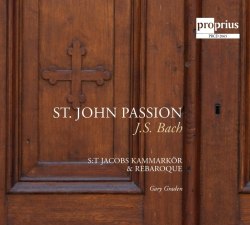| 
|
Johann Sebastian BACH (1685 - 1750)
St John Passion, BWV 245
Jeanette Köhn (soprano), Mikael Bellini (alto), Mikael Stenbaek (Evangelist) (tenor), Lars Johansson Brissman (Pilate), Håkan Ekenäss (Jesus) (bass)
St Jacobs Chamber Choir, REbaroque/Gary Graden
rec. live, 16-17 April 2011, St Jacobs Church, Stockholm, Sweden. DDD
Texts and translations included
PROPRIUS PRCD 2065 [33:59 + 72:12]
Every country has its own traditions in classical music. In Britain no Christmas period is complete without a performance of Handel's Messiah. In the Netherlands, where I live, the Netherlands Bach Society performs Bach's St Matthew Passion every year on Good Friday since its foundation in 1921. The present recording of his St John Passion also documents an old tradition: this work was first performed in Sweden in 1898 under the direction of the composer Wilhelm Stenhammar. The tradition of performing this passion in St Jacob's Church in Stockholm goes back to 1945 when a performance took place under the direction of Set Svanholm. He was cantor of this church from 1929 to 1949 and at the same time the leading Wagner tenor of his time. In 1949 the job was taken by Eric Ericson who would become one of the most renowned choral conductors of the second half of the 20th century. In the 1970s he was succeeded by Stefan Sköld; at that time the use of period instruments started. Now it is American-born Gary Graden who is the cantor of this church and continues this rich tradition.
It is understandable that such a tradition is documented on disc. The booklet doesn't mention any previous recordings; it would surprise me if no previous performance had ever been recorded. One would expect that at least some performance under Ericson's direction had been recorded. There certainly will be many people who have attended one or more performances who would like to have one of them on disc. However, whether such could compete with the large number of recordings which are available on the international market is a different question.
There can be little doubt about the qualities of the St Jacobs Chamber Choir; its recording of Bach's motets was given a positive review by Dominy Clements. With its more than thirty singers it produces a remarkably transparent sound and the text is quite easy to follow. That said, this size is not ideal for Bach's passions. Especially problematic is the balance between choir and instrumental ensemble. REbaroque plays with one instrument per part, and in the tutti episodes that results in them having too little presence.
The turbae are quite dramatic and here one can admire the qualities of the choir. Even at high speed the structure remains intact; the articulation and dynamic accents prevent any of them turning into a big mess. The chorales are less convincing: there is too little attention to the text, and the tendency to hold the closing chord rather long is stereotypical. The opening chorus comes off quite well, but there could have been stronger dynamic accents and the rhythmic pulse could have been more clearly exposed.
The team of soloists has some serious weaknesses. Mikael Stenbaek has an agile voice which is perfectly suited to the part of the Evangelist. The problem is that his interpretation is not very idiomatic. He too often sings legato; there is a lack of that natural accents that every orator uses by instinct in his own language. Stenbaek is not a real narrator. In recitatives the rhythm needs to be treated more freely than is the case here. In the arias I like him more, but even here the articulation should have been sharper.
Some of these features are also present in the singing of the other soloists. Håkan Ekenäss is rather disappointing in the role of Jesus. He doesn't radiate much authority and his singing is marred by a consistent slight tremolo. Because of that his arias also make little impression. Lars Johansson Brissman is very good in the role of Pilate. Mikael Bellini has a beautiful voice, but is not that powerful. The A part of 'Es ist vollbracht' is exquisitely sung, but when it comes to proclaiming Jesus' victory (Der Held aus Juda siegt mit Macht) he apparently is not able to raise his presence. 'Von den Stricken' is not unproblematic either, because his voice is somewhat overpowered by the two oboes. The two soprano arias are the best of this recording. I had never heard of Jeanette Köhn, but I am impressed by the way she sings here. Her articulation and diction are perfect, and she gives fully idiomatic and stylishly convincing interpretations of these arias.
There are some issues which puzzled me. The lute plays a quite prominent role in the recitatives, but I can't see any historical justification for that. The opening chorus of the second part is preceded by an organ improvisation. Again, I don't see the reason.
Some tempi are very fast. That goes especially for the tenor aria 'Ach, mein Sinn'. It is rushed through and as a result has no impact. When the Evangelist recounts that Jesus is scourged Bach uses a musical figure which graphically illustrates the act of scourging, but the tempo is so high that its effect is largely nullified.
To sum things up, this is a very respectable performance, and I can fully understand that people flock every year to the performances in St Jacob's Church. The dramatic character of this passion is very well conveyed. However this performance from 2011 has a couple too many weaknesses to stand up to the competition of the best.
Johan van Veen
http://www.musica-dei-donum.org
https://twitter.com/johanvanveen
 |
 |
|











